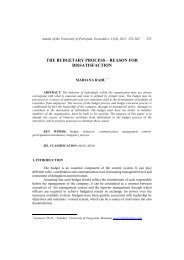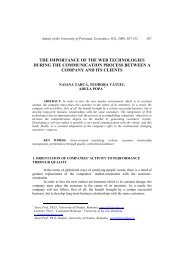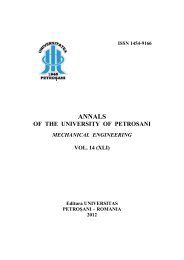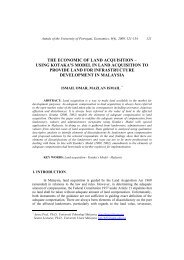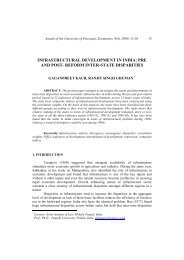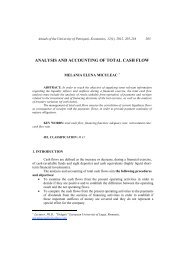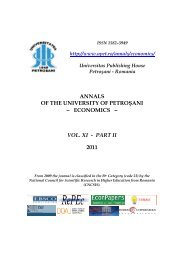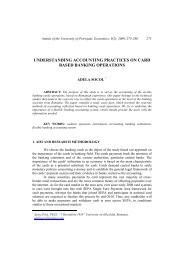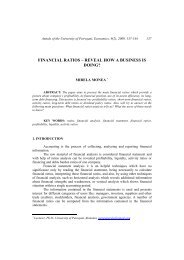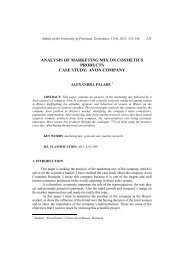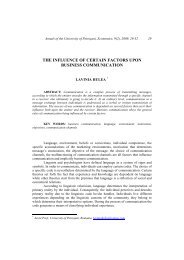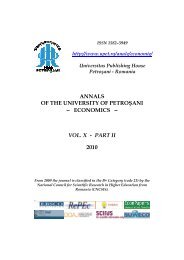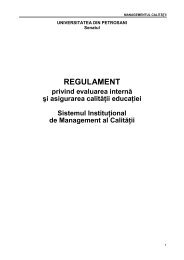annals of the university of petroÅani â¼ economics â¼ vol. xi - part i ...
annals of the university of petroÅani â¼ economics â¼ vol. xi - part i ...
annals of the university of petroÅani â¼ economics â¼ vol. xi - part i ...
Create successful ePaper yourself
Turn your PDF publications into a flip-book with our unique Google optimized e-Paper software.
238 Schmidt, M.C.; Andrioni, F.<br />
and financial context, without subvention, due to <strong>the</strong> annulment <strong>of</strong> <strong>the</strong> European<br />
regulation regarding <strong>the</strong> state support <strong>of</strong> <strong>the</strong> pit coal production. The new regulations <strong>of</strong><br />
<strong>the</strong> European Council regarding coal mining activities, valid since January 1, 2011,<br />
stipulates that <strong>the</strong> mining units in <strong>the</strong> states that are members <strong>of</strong> <strong>the</strong> European Union<br />
can benefit from <strong>the</strong> state support only in order to shut down non – competitive mines.<br />
Under <strong>the</strong>se circumstances, <strong>the</strong> continuation <strong>of</strong> C.N.H. activities in<strong>vol</strong>ves drastic cost<br />
reductions, such as, for instance, <strong>the</strong> first decision in <strong>the</strong> history <strong>of</strong> <strong>the</strong> Jiu Valley<br />
mining to suspend <strong>the</strong> granting <strong>of</strong> facilities for pensioners for a limited period (1–31<br />
January 2011). The financial effort for <strong>the</strong> facilities granted to a number <strong>of</strong> over 10,400<br />
de pensioners, with a number <strong>of</strong> 8,745 employees, was <strong>of</strong> 8.6 million lei/year (C.N.H.,<br />
Press statement, 05.01.2011) 2 .<br />
3. THE SOCIAL POLICY IN THE JIU VALLEY IN THE CONTEXT OF THE<br />
RESTRUCTURING OF THE MINING SECTOR<br />
Starting from <strong>the</strong> fact that „work is <strong>the</strong> strongest link between <strong>the</strong> individual<br />
and society” (S. Freud), unemployment means not only income losses, but also <strong>the</strong> loss<br />
<strong>of</strong> self confidence, <strong>the</strong> erosion <strong>of</strong> <strong>the</strong> connection with <strong>the</strong> community and <strong>the</strong> feeling <strong>of</strong><br />
being excluded from normal life, which can be a genuine threat to democracy (Codin,<br />
1990, p. 146). Under <strong>the</strong>se circumstances, <strong>the</strong> essential objective <strong>of</strong> social policies in<br />
Romania is to guarantee a job and decent living, ei<strong>the</strong>r by <strong>the</strong> individual’s direct work<br />
or by means social protection and assistance services.<br />
It is necessary to ensure an environment meant to facilitate studying and work<br />
and to turn work into <strong>the</strong> main source <strong>of</strong> living, so that <strong>the</strong> ones who work should<br />
enjoy <strong>part</strong> <strong>of</strong> <strong>the</strong>ir work results directly, „feeling it is worth working and <strong>the</strong>ir work can<br />
ensure <strong>the</strong>ir living” (Stegăroiu, 1993, p. 14).<br />
Social protection represents <strong>the</strong> body <strong>of</strong> policies, measures, institutions, and<br />
structures that ensures a certain level <strong>of</strong> wealth and social security for <strong>the</strong> whole<br />
population, and especially for certain social groups or persons unable to achieve<br />
minimal, normal life conditions through <strong>the</strong>ir own effort. By juridical regulations,<br />
social protection applies national and regional programs in order to provide material<br />
and financial support, as well as social services destined to deprived persons. There are<br />
two types <strong>of</strong> support meant to ensure <strong>the</strong> social protection <strong>of</strong> deprived persons<br />
(Cojocaru, 2003, p. 620): <strong>the</strong> system <strong>of</strong> social insurance (<strong>the</strong> funds resulting from <strong>the</strong><br />
systematic contributions <strong>of</strong> <strong>the</strong> active population, which return to <strong>the</strong> contributors<br />
when <strong>the</strong>y are in need, in accordance with each individual contribution, under <strong>the</strong> form<br />
<strong>of</strong> pensions, unemployment support, ill health support, etc.); <strong>the</strong> system <strong>of</strong> social<br />
assistance (support system financed from <strong>the</strong> state budget, local budgets, and <strong>vol</strong>unteer<br />
contributions <strong>of</strong> physical and juridical persons).<br />
Social assistance represents <strong>the</strong> body <strong>of</strong> institutions, programs and measures,<br />
as well as pr<strong>of</strong>essional activities meant to protect persons, groups or communities<br />
facing social problems or temporary crisis. By specialized services and activities,<br />
social assistance helps groups and persons in need to overcome difficult moments that<br />
2 http://www.cnh.ro/descrierecomunicate.asp<strong>xi</strong>d=95



